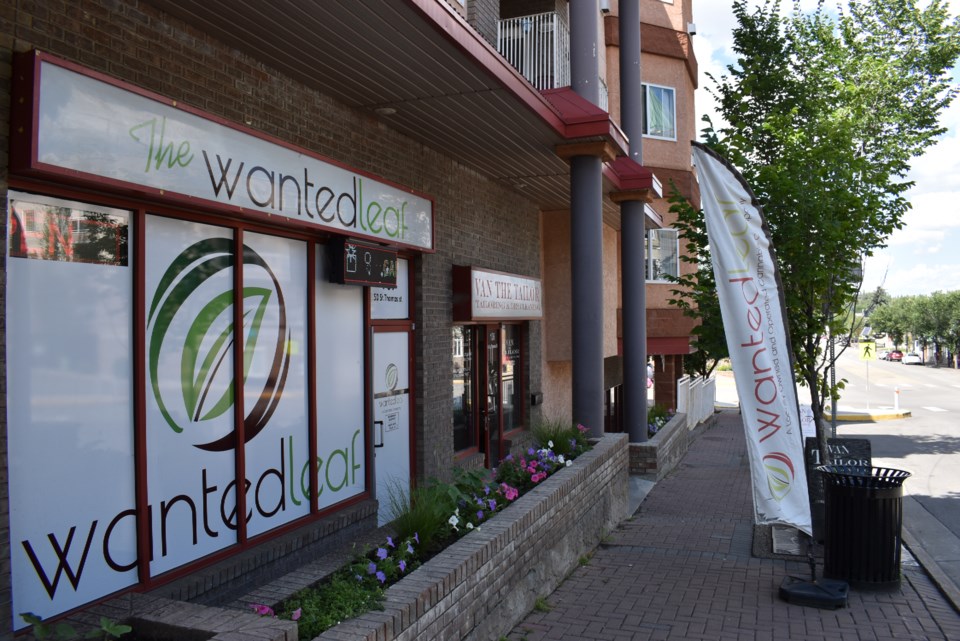With no new store openings on the horizon, it appears the retail cannabis sector in St. Albert may have stabilized.
According to an Alberta Gaming, Liquor and Cannabis (AGLC) directory, there are 12 licensed cannabis stores operating in St. Albert today. But after a steady stream of applications for new weed brick-and-mortar stores since legalization in 2018, not a single one has been filed in 2024. Just one was filed in 2023.
This could be the result of the market entering a "shake-up period," according to Dr. John Precjus, an associate professor of marketing, business economics and law at the U of A’s Alberta School of Business. Reached by phone Tuesday, he said a similar settling down of excitement and investment has already occurred in the manufacturing (growing) side of the industry.
“There was everybody getting into it, lots of investor money poured in, a lot of over exuberance in the market,” he explained. “There were huge swings in stock market valuations. And, finally, we settled at an equilibrium that was much lower than the peak. And I suspect that the same thing is happening in retail, just a little bit later.
“So, we had lots and lots of people entering, lots of investor money driving a huge volume of new stores in especially Alberta and now we're in the shaking out period where it's possible that some neighbourhoods are over-stored and not all of them are probably going to survive.”
However, Precjus said it’s “surprising” not that no new stores opened this year, but that there aren’t even any applications.
“Zero is always surprising,” he said. “I would think that there would always be somebody who doesn't know, you know, the market well enough or something that would at least go through the trouble of applying for a licence. The fact that nobody did that, I think is surprising; (but) the fact that there are no new stores opened would not be surprising.”
It should be no surprise that cannabis store license applications to the AGLC for St. Albert peaked at 20 in 2018, the year the electric lettuce was legalized. There were eight such applications in 2019, seven in 2020, six in 2021, eight again in 2022, just one in 2023 and none so far in 2024.
In the same time, no license applications were denied by the AGLC, but a number of applicants each year chose not to proceed at some point in the process: six in 2018, seven in 2019, three in 2020, one in 2021, seven in 2022 and two in 2023.
Also according to the AGLC, just a handful of approved licenses have been cancelled or not renewed by the applicant since legalization: none from 2018 to 2020, one in 2021, three in 2022, two in 2023 and one in 2024.
The market decides
Alberta probably took the least restrictive approach to cannabis retail once the federal government decided to leave regulation of the sale to the provinces and territories.
“Especially initially, at the beginning it looked like Ontario was going to have an LCBO-type (a government-run monopoly) situation or something like that,” Precjus said. “And other provinces had, you know, very strict restrictions about the number of stores that could open. But you know, Alberta said, ‘we'll just let the market figure it out’. And I think now the market is figuring it out.”
Unlike other products, when legal weed arrived on the scene, investors didn’t have a good idea of how big the market was.
“I think a lot of people erroneously thought that once they legalize it, that a lot more people were going to start smoking,” Precjus explained. “And the reality is, is that it's kind of a niche product: The majority of people don't really like cannabis that much. They try it and they say ‘Nah, not for me’.
“I know there was a lot of buzz in the liquor store space that all this is going to take away our business. And there has been some evidence that some very, very slight reduction in beer sales in places that have legalized cannabis but not a significant change in alcohol sales.”
“What's really happened is that the black market has switched over to being sold in retail stores. I don't think there's a tremendous number of new users. So I would imagine we would definitely be reasonable to expect fewer applications and fewer openings going forward.”
Precjus added that the stores that are around after the market shake-up are less likely to be independent mom-and-pops and more likely to be chains.
“You have some big players, right? You think about Alcanna (a Calgary-based company acquired by Sundial for $320 million in 2022). They're not only a big player in the cannabis space, they're also a big player in the liquor store space, both in the US and Canada. They have deep pockets, so to speak, to ride out the shakeout period. So, you’re going to probably see some players like them emerge because they can keep stores open for a very long time without earning huge profits.
“I suspect, as is the case with many with many businesses, you know, the people with deep pockets will be standing at the end of the day.”




